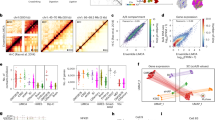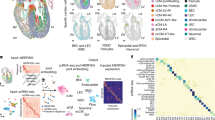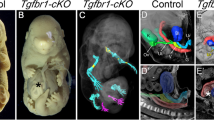Abstract
The function of the frizzled (fz) locus is required for the development of a parallel array of bristles and hairs on the adult cuticle of Drosophila melanogaster1,2. Marked fz mitotic clones from five alleles were generated and examined in the wing. Three alleles have a non-cell-autonomous hair polarity phenotype; wild-type cells distal to fz clones produce hairs that have an abnormal polarity. In contrast, fz clones of the other two fz alleles examined do not disrupt the polarity of neighbouring cells. These data suggest that fz has two mutably separate functions in establishing hair polarity on the wing. One function involves the transmittance and/or generation of a polarity signal along the proximal-distal axis of the wing. The second function involves the cellular interpretation of a polarity signal.
This is a preview of subscription content, access via your institution
Access options
Subscribe to this journal
Receive 51 print issues and online access
$199.00 per year
only $3.90 per issue
Buy this article
- Purchase on Springer Link
- Instant access to full article PDF
Prices may be subject to local taxes which are calculated during checkout
Similar content being viewed by others
References
Gubb, D. & Garcia-Bellido, A. J. Embryol. exp. Morph. 68, 37–57 (1982).
Adler, P., Charlton, J. & Vinson, C. Devl. Genet. (in the press).
Piepho, H. Biol. Zbl. 74, 467–474 (1955).
Lawrence, P. A. J. exp. Biol. 44, 607–620 (1966).
Strump, H. J. exp. Biol. 49, 49–59 (1968).
Nusslein-Volhard, C. & Weischaus, E. Nature 287, 795–801 (1980).
Weischaus, E. & Riggleman, R. Cell 49, 177–184 (1987).
Mitchel, H. K., Roach, J. & Peterson, N. S. Devl. Biol. 95, 387–398 (1983).
Garcia-Bellido, A. & Merriam, J. R. Devl. Biol. 24, 61–87 (1971).
Morata, G., Sanchez-Herrero, E. & Casanova, J. in Single Cell Marking and Cell Lineage in Animal Development (eds Gardner, R. L. & Lawrence, P. A.) 139–144 (Cambridge University Press, 1986).
Stern, C. in Genetic Mosaics and Other Essays (Harvard University Press, 1968).
Becker, H. J. Z. VererLehre 88, 333–373 (1957).
Ferrus, A. thesis, Univ. Autonoma de Madrid (1976).
Vinson, C. thesis, Univ. Virginia (1987).
Klein, L. thesis, Univ. Virginia (1987).
Vinson, C. & Adler, P. Drosphila Information Service 66 (in the press).
Lawrence, P. A. in Developmental Systems: Insects 2 (eds Counce, S. J. & Waddington, C. H.) 157–206 (Academic, London, 1973).
Nardi, J. B. & Kafatos, F. C. J. Embryol. exp. Morph. 36, 489–512 (1976).
Tucker, J. B. J. Embryol. exp. Morph. 65, 1–25 (1981).
Bissell, M. J., Hall, G. & Parry, G. J. theor. Biol. 99, 31–86 (1982).
Author information
Authors and Affiliations
Rights and permissions
About this article
Cite this article
Vinson, C., Adler, P. Directional non-cell autonomy and the transmission of polarity information by the frizzled gene of Drosophila. Nature 329, 549–551 (1987). https://doi.org/10.1038/329549a0
Received:
Accepted:
Issue Date:
DOI: https://doi.org/10.1038/329549a0
This article is cited by
-
Planar cell polarity pathway in kidney development, function and disease
Nature Reviews Nephrology (2021)
-
Comprehending the crosstalk between Notch, Wnt and Hedgehog signaling pathways in oral squamous cell carcinoma - clinical implications
Cellular Oncology (2021)
-
Wnt signaling in breast cancer: biological mechanisms, challenges and opportunities
Molecular Cancer (2020)
-
Antagonistic PCP Signaling Pathways in the developing Drosophila eye
Scientific Reports (2018)
-
Wnt-induced Vangl2 phosphorylation is dose-dependently required for planar cell polarity in mammalian development
Cell Research (2017)
Comments
By submitting a comment you agree to abide by our Terms and Community Guidelines. If you find something abusive or that does not comply with our terms or guidelines please flag it as inappropriate.



